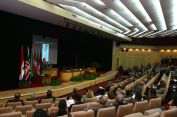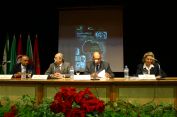Africa’s ‘Big Issues’ presented on the First Day of the North Africa Regional Consultation
Posted on
Alexandria, 15 December 2004-
Thinking About Africa’s Future was the title under which Dr. Ismail Serageldin, Director of the Bibliotheca Alexandrina (BA), gave his presentation at the opening ceremony of the North Africa Regional Consultation, held at the Library of Alexandria, 14-16 December 2004.
In his word, Dr. Serageldin subtly presented the ‘big issues’ hindering African development. He stated that civil wars, disrupted governments, debts and obstructed financial flows, as well as the semi-total reliance on primary commodities such as mining oils and agricultural products and the spread of terminal diseases such as AIDS, are among the major problems countering progress throughout the African continent. Dr. Serageldin’s presentation strongly stressed the need for the building of scientific and technological capacities in Africa, saying that “scientific research is a necessity, not a luxury”.
The New Partnership for Africa’s Development (NEPAD) was represented by Ambassadors Mohamed Hashashy and Ibrahim Hassan, as well as Simon Mills. “NEPAD is a vision and strategic framework for Africa’s renewal”; it is designed to address the current challenges facing the African continent. Issues such as the escalating poverty levels, underdevelopment and the continued marginalization of African needs are some of the issues addressed by the program. Its objectives are to eradicate poverty, place African countries on the path to sustainable development, halt the marginalization of Africa in the globalization process and accelerate the empowerment of women.
Julia Marton-Lefevre, Executive Director of the Leadership for Environment and Development (LEAD) International, spoke next and outlined to the audience, the role played by LEAD in African development. The organization has undertaken a Pan-African approach towards achieving progress in the continent. His Rt. Hon Paul Boateng MP, Chief Secretary to the British Treasury, conveyed the regards of British PM Tony Blair and his unflagging support to the Commission for Africa. He said that “through the Millennium Development Goals, [stated by the United Nations five years ago], members of the international community have promised to right to the greatest wrongs of our time”. He conveyed the United Kingdom’s (UK) ambition to establish a compact between developed and developing nations and asserted that more financial resources must be allocated for international aid.
Dr. Youssef Boutros Ghali, Egyptian Minister of Finance, started his presentation by emphasizing the strong bond between Egypt and the African continent. He agreed with previous speakers on the immensity and magnitude of African problems, but posed the question of whether “we should slide into depression, or do we rise to the challenge and say we can do it? Invariably, we take the second choice and look for solutions”. Dr. Ghali asserted that the African problem needs an African solution; local talents need to be developed, African funds need to be obtained and the MFN principle of trade applied between African countries.
Following a lunch break, attendees were divided into three work groups: (I) Governance and Effective States: Peace and Security (II) Opportunity and growth: Trade, Investment, NRM and Agriculture, Aid and Debt Relief (III) Human Development, Culture and Inclusion. Participants worked to throw light on these issues as they pertain to the African continent, peoples and cultures.
 |
 |
Dr. Ismail Serageldin
during his presentation |
The Opening Session |